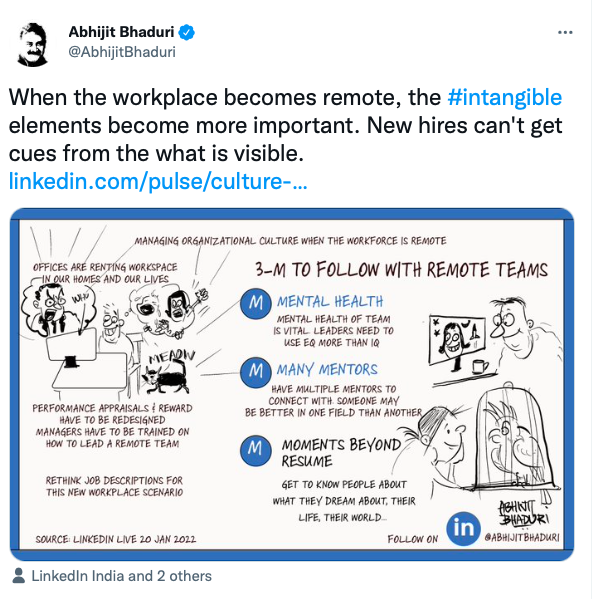How to build a good organizational culture for a remote workforce?

The challenges faced by organizations due to the sudden shift to remote work in 2020 were unprecedented across industries. It resulted in a lot of trial and error, with plenty of issues to be addressed in terms of connectivity and maintaining business as usual. The most important of them all was maintaining the culture of the organization. Remote work has made it difficult for an organizational culture to take hold.
LinkedIn News India on 20th January conducted a LinkedIn Live with Abhijit Bhaduri and Pallavi Pareek to discuss the responsibility of the employer and the employee in building and nurturing a culture of trust, accountability, and safety for all.
This live was hosted & moderated by Ankit Vengurlekar, the Managing Editor at LinkedIn News. Here are a few key takeaways from the session which I truly agree on from my understanding and perspective:
1. TRUST & EMPATHY
When an employee joins the organization he/she shows a lot of trust in the organization. It is important for the organization to maintain trust. Empathizing with the employees will encourage them in the WFH space.
2. CONSIDERING THE CHANGE IN THE RESPONSIBILITIES
Also, it is on the organization to look at the responsibility of the employees through a changed lens as the work is now not restricted to the physical premises of the office but the space of office and home is a shared one. Thus, the responsibilities of the employees should be changed irrespective of gender. And hence, the performance of the employees should be weighed accordingly
Pallavi said, the flexibility given to women employees owning to their personal responsibilities should also align with the process of performance appraisal. The flexibility given to employees and performance appraisal performance should be done in an equitable manner.
3. BEYOND THE MONETARY CONSIDERATIONS
Money in my eyes was the funniest thing earlier. One pays money and can get things done on one order. Money in the current scenario is now not just enough to hire. The perks, benefits, and satisfaction associated with the organization play a major role in the organization retaining its employees. In the work-from-home setup, it becomes imperative that the organizations understand the psychological needs of employees.
Ankit highlighted, that not many leaders, managers, or employers are actually equipped from their EQ & IQ to lead remote teams in the new normal, which is a huge area of concern.
4. The 3 M MODEL

Abhijit Bhaduri mentioned the three Ms that employers need to take cognizance for building a successful remote-work culture. He also emphasized that organizations must give due consideration to situations in which their employees are working and design the job description with a gender lens.
Mental health: There has been a lot of frustration rising amongst the employees during the pandemic. The organization should take care of the mental health of the employees and the employees should too take care of the mental peace they deserve.
Mentorship: Employees should strive to have more than one Mentor in the organization to connect with them on various topics, aspects, and conditions. You might have an urge to share something or the other with the correct mentor for guidance, support, and definitely better mental health.
Moments of Informal Conversation: Most important that I personally feel, building connections in the organization that can go beyond the premises of the working physical space. Even when you’re doing WFH, you can just go on a zoom call, have lunch with your colleague and not feel the distance. Share your thoughts outside the work conversation and relax. This is essential especially during the remote workspace.
5. ACKNOWLEDGE & APPRECIATE
Last but not the least, one most important aspect that organizations should understand is that value your employees, appreciate them because they are the brain behind expanding the business and generating positive numbers. Everyone understands “Customer is God” but don’t let the employees take a backseat, make them feel special and open your boundaries to come first for the organization.
6. CONSIDERING ALL THE STAKEHOLDERS
Moreover, my personal thought is that employees should be made felt a part of the family even in the remote space, connecting with the employees’ families, and sharing the commonalities will build a good rapport and will be a step in building a culture in the remote workspace.
Navigating remote work is equally difficult for everyone in the workforce — the number of variables and the chances of problems developing is high if it isn’t done properly. I hope these pointers help you in executing a successful remote workplace culture.
About the author: Shubhra Bhargava is a double postgraduate specializing in HR. She has worked at multiple organizations as an intern like TIET- Patiala, Coalshastra – New Delhi, Sun Pharma – Gurgaon in different roles. She was working as a full-time employee as an HR Strategist with NVISH IT Solutions – Mohali and is currently working as an HR Freelancer.
Ungender Insights is the product of our learning from advisory work at Ungender. In our initiative to build inclusive workplaces for all individuals, we continue to educate and advise leaders on the same. Write to us at contact@ungender.in to know more about our advisory services.
Read our insights about diversity, legal updates and industry knowledge on workplace inclusion at Ungender Insights. Visit our Blog.
Sign up to stay up-to-date with our free e-mail newsletter.
The above insights are a product of our learning from our advisory work at Ungender. Our Team specialises in advising workplaces on gender centric laws.
or email us at contact@ungender.in




